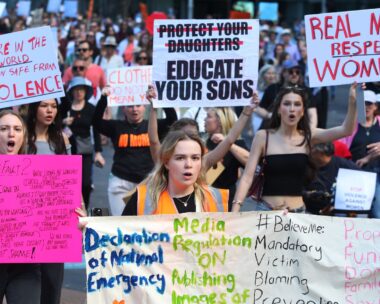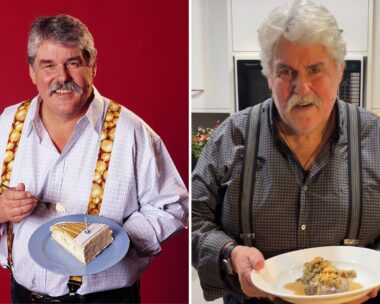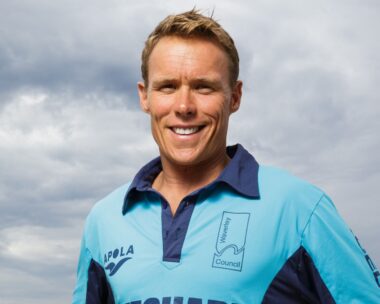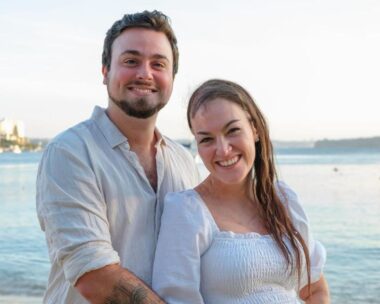Sydney teenager Paula Hitchcock and her mother, Pratt’s long-time mistress Shari-Lea, have settled their claim over Richard Pratt’s fortune with the billionaire’s widow Jeanne.
Long time mistress of the Visy billionaire, Shari-Lea had claimed she was not being adequately provided for as she was in a de facto relationship with Pratt.
The settlement was reportedly reached in Victoria and according to The Sydney Morning Herald is a strictly confidentiality agreement.
But media reports claim Paula will receive $23 million.
Hitchcock isn’t the only mistress who has attempted to claim rights over the Pratt’s will.
In February Sydney escort Madison Ashton’s case was thrown out of court after she claimed Pratt promised to provide for her.
She says Pratt made her give up escort work in exchange for a $500,000-a-year allowance and a $5 million trust fund for her two children.
However her claims did not stand-up in court.
Pratt died from prostate cancer in 2009, aged 74. His widow, Jeanne is the executor of his estate.
In 2010, The Weekly’s Michael Sheather spent time with Shari-Lea and her daughter Paula.
Here is the full story.

Shari-Lea in her Watsons Bay home.
It’s the kind of photograph you might find on a mantelpiece or sideboard in any family home.
It sits on the piano in Shari-lea Hitchcock’s formal lounge, a gilt-framed photograph of a broadly smiling man and a delighted little girl.
The girl,dressed in a party dress, is perched atop a small palomino pony named PJ with a pink ribbon tied in a small bow around his neck.
The difference between this photograph and thousands of similar photographs taken at children’s birthday parties around the country is the relationship that it represents.
The man is Richard Pratt, the cardboard box billionaire, who died seven years ago.
The little girl is Paula Sarah Hitchcock, Richard Pratt’s youngest daughter and the child he fathered with former lawyer and model Shari-lea Hitchcock.
Today, Paula is heir to a reported $23million inheritance from her father’s estate and is one of the richest little girls in the country.
“That photograph is one of my favourites,” says Paula, who was 12 when we met.
“We were at Chinamans Beach, on Sydney’s North Shore. It was my sixth birthday and PJ was my first pony. I wanted a pony and my dad bought him for me. It was a wonderful surprise.
“But that’s just one memory I have of my dad. I liked to go to the snow with him and we would go skiing down big mountains. I also remember being at his house in Melbourne, Raheen. It is very big and the person who created the glass pyramids at the Louvre in Paris designed the modern part of the house. I remember there are big gardens and I used to run through them. They’re so big, you can get lost in them.”
Paula Hitchcock is an engaging girl, bright and vivacious. She is very much aware of who her father was and what he managed to achieve.
She lives with her mother, Shari-lea, in a double-storey waterfront home in Sydney’s eastern suburbs.
Together, Paula and Shari-lea form the other half of Richard Pratt’s life; the half that didn’t involve his factories or his charities or his family in Melbourne.

Dressed in shorts and a T-shirt, Shari-lea is warm and welcoming as she opens the door to her home.
Hanging just inside the door, alongside several of Shari-lea’s own paintings and sketches, is her Master of Laws degree from the University of NSW, signed and dated October 15, 1999.
Shari-lea offers coffee in a pair of rare and elegant giltedged Royal Albert cups, a gift from her grandmother and named, she says, after the famous Madame de Pompadour, who, as it turns out, was a celebrated mistress to France’s 18th-century King Louis XV.
Shari-lea and Richard Pratt were part of each other’s lives for 18 years, until he died, aged 74, on April 28 2009, from prostate cancer.
Almost a year on when I was seated in her home, the reverberations from his death are still being felt.
In her only interview, Shari-lea Hitchcock speaks for the first time about the life she now shares with daughter Paula and their favourite memories of the late tycoon.
Shari-lea tells about how she met Richard, formed a bond and, eventually, a life and a family with him.
She also talks openly about her saying goodbye to him as he lay dying in his Melbourne family home and about how she regrets her decision not to attend his funeral.
Perhaps most importantly, she speaks about Paula and their hopes for the future.

Richard Pratt was a larger-than-life figure in Australian business.
During a career spanning more than half a century, he had turned his father Leon’s small cardboard box factory in Melbourne into a vast global empire –
the Visy packaging and recycling group of companies – and in the process amassed an estimated $4.3billion in company and property wealth.
At the time Richard Pratt met Shari-lea, in 1990, he was already one of the richest men in Australia, but Shari-lea – a country girl, the younger daughter
of a builder and a riding instructor, who came to the city to study law – had no idea who the industrialist was when they literally bumped into each other at a function in Sydney.
Their attraction, says Shari-lea, was immediate and strong. “I was at a function and I just thought, ‘This isn’t really my scene’, and when I turned
around to leave, Richard was standing nearby and he looked at me, and said, ‘You’re not leaving, are you?’ ” recalls Shari-lea.
“I looked back at him and said, ‘Well, I’m not now.’ I was intrigued that he was clever enough to work out what I was feeling by my attitude. It was one
of those moments when someone says something unexpected and, suddenly, they spark your interest.”
They introduced themselves, chatted and exchanged phone numbers, but Shari-lea wasn’t sure whether she would hear from him again or not.
A few days later, he rang and asked her to lunch.
“He was very flattering,” she recalls.
“Richard never did anything by halves. He could be almost overwhelming. If he wanted something, he would definitely work hard for it. I found him very handsome, but what was even more attractive was his personality.
“He was fabulous and very different to anyone I had ever met before: dynamic and fascinating. I just found him very attractive. He was in his 50s. The
pictures of him in later life are nothing like when I met him. He was definitely at the peak of his life at that point and it showed.
“There was a sense of power around him when he spoke. He was very funny and really captivating. I was a very young country girl and I was quite overwhelmed by it all.”
Shari-lea was born on November 14,1969, on the NSW South Coast, the youngest daughter of Shawne, a riding instructor, and Allan Hitchcock, a builder (who now works for Visy), in a small town near Nowra.
She attended Bomaderry High School, where she was a promising student with an artistic bent, but left school at 16 to become a cadet journalist on a local newspaper, the South Coast Register, completing her HSC at night while working full-time.
Yet her ambitions outweighed the country town where she grew up and, within a few years, she gravitated to Sydney, where she modelled part-time
and, eventually, gained admission to study law.
“I never came to Sydney with the idea that I would get married and have children,” she says.
“That was never really the idea. I was too busy achieving what I wanted to achieve.”
She was working full-time in sales and marketing at a computer company and was a part-time model, even winning a modelling competition in
Cosmopolitan magazine.
“I was doing a little bit of modelling, mostly shopping centre parades, a couple of lingerie catalogues,” she says.
“I was an extra in [the film] Strictly Ballroom, which was fun because somebody mistook me for [the character] Tina Sparkle and took me upstairs to
where all the stars were and had me made-up, and I was thinking, ‘Gee, they treat extras well’. I did Home And Away extra work and little short films
for Tropfest.”
It was at this point that Richard walked into her life. Their relationship began almost immediately. Shari-lea says she didn’t know who or what
Richard Pratt was.
“I certainly didn’t have any idea,” she says.
“I could tell after a month or two that he was doing well in life, but then I read a newspaper article about Australia’s newest billionaire and it was Richard. I was so angry that he hadn’t told me.
“It was very daunting and I had second thoughts about the whole thing. I just didn’t realise that his life in Melbourne was that extraordinary and my first instinct was to back away from that.”
Richard, however, was nothing if not a persuasive man. Shari-lea soon realised she had already fallen in love with him and that theirs would be, by necessity, an unconventional relationship.
“I was leading my own life in Sydney,” she says.
“I’d always been a very independent person. I was 22 or 23 when I met Richard and I’d already been studying law for a year and a half. I was doing night courses at Sydney University and working with a computer firm during the day. I had a pretty full-on schedule.
“Every weekend was spent with my books. I was working full-time and trying to pay my rent, pay my car off and pay my mortgage.
“Before I met Richard, there were times when I would accept a date to go to dinner just so I would get some food that night. I was literally on a shoestring.”
That changed, however, when Richard became a large part of her life, yet she maintained her own identity and career.
At first, she continued with her study and job, then, when she graduated as a lawyer, she won positions with several prominent Sydney law firms,
including Mallesons Stephen Jaques and Gayle Meredith and Associates, as a solicitor, and the Electronic Data Systems company, where she worked
on contracts.
Shari-lea says she saw Richard often, but declined to elaborate on the frequency of their meetings, saying that there were many delicate areas of her
life that, even now, she could not discuss “because there are other people involved and we don’t need to reopen old wounds”.
Shari-lea fell pregnant in 1997 and gave birth to Paula, named after Richard’s mother, in 1998.
Her pregnancy was difficult, complicated by the fact that she has been a vegetarian most of her adult life.
“I was so sick,” she says. “I was anaemic because I’m a vegetarian. I thought I had cancer. But once we worked out what it was, I started taking
iron tablets, but I had a terrible time.”
Yet her ordeal turned to joy when Paula was born.
Shari-lea says that Richard was a doting father.
“His eyes lit up whenever she came into the room,” she says.
“He was so sweet with her and he wanted her to have the very best in the world. He was just wonderful, really. I guess you can judge somebody by how hard they work and how much they love their children.
“I would think it would be difficult for anyone to be a better father. And he loved all his children. But he went out of his way to make sure Paula felt loved and that he was there for her. I guess he didn’t have to, but he wanted to.”
Shari-lea says she loved Richard. And that was a constant even after the news of their relationship hit the front pages of the nation’s newspapers in 2000, when a legal action by a former nanny brought the matter into the public domain.
“I felt like I was hung out to dry by the media,” says Shari-lea.
“They painted me as the vixen who came into Richard’s life, but I wasn’t. They just painted a very bad picture, but I knew my own virtues
and that was all that mattered.
“It’s weird how it all works. I picked up some friends because of what happened in the media. The fact that you are suddenly getting a front row seat
at a fashion parade because you have just had a media scandal – it can be a strange world.”
Asked how Richard treated her, she is clearly moved.
“He was such a gentleman, such a lovely person,” she says, visibly upset.
“I wouldn’t have stayed with him if he wasn’t. I had never been out with someone who treated a woman so beautifully. He would make tea in the morning and bring me toast. He was a generous man, not just in a material sense, but emotionally, too.”
Shari-lea was aware in later years that Richard was ill and had been aware for some time. Yet news that he was probably dying shocked her. His family
in Melbourne arranged for her to visit Raheen (a former bishop’s palace and their family home) in the days before his death.
She had hoped for a chance to say farewell in private, but it was not to be.
“I wasn’t allowed to be on my own with him, which I found very stressful,” she says.
“There was a little troop of people in the room. I don’t know what they were all worried about, but I found it very confronting. It was appalling. I
wasn’t able to say some of the things I wanted to say. I was so overcome, I wasn’t able to say much anyway. I showed him a picture of Paula and a
friend standing in her newly finished bedroom, which he hadn’t been able to see, and there were tears in his eyes.”
Paula, then 11, was flown by private jet to her father’s funeral at the Kew synagogue, where she sat in an upstairs gallery with her grandfather, Allan.
Shari-lea, out of consideration for Richard’s widow, Jeanne, and adult children Anthony, Heloise and Fiona, decided not to attend.
“On the day of his funeral, I made the decision not to go,” she says. “It would have been just too traumatic, I think, for everyone, but I think that was the wrong decision for my daughter. I think she really did need me there. But, I think it was the right decision in terms of other people and their concerns, but it was a terrible, difficult day and I don’t think I have really had closure yet.”
“She’s a very mature little girl,” says Shari-lea of her daughter.
“I think she shares a lot in that way with her father. She is very confident in her abilities, has a lot of his nature. She’s very rational and able to deal
with a setback very easily, able to move on. She’s quite extraordinary in that way and so was Richard.
“Paula is certainly not a drama queen. She’s easy to be around. There are so many little things that she does which are like him: the way she asks a
question, gets right to the heart of the matter, the way she weighs up a problem and finds a solution.”
This story was originally published in The Australian Women’s Weekly in 2010.






